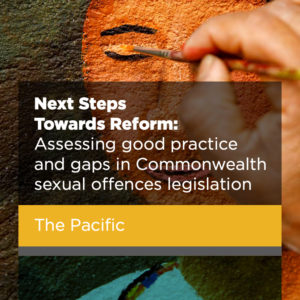Samoa’s sexual offences laws are in the Crimes Act 2013 (CA). The Evidence Act 2015 (EA) contains the evidentiary rules for all criminal offences, including sexual offences.
In 2013, Samoa enacted the CA which replaced and modernised the Crimes Ordinance 1961. The Act made significant changes to sexual assault offences in Samoa, some of which meet the good practice standards applied in this report. For example, under the offence of ‘sexual violation’, a range of sexual penetration acts are criminalised as ‘unlawful sexual connection with another person’ without consent. The circumstances in which consent cannot be given are expressly set out. Further, the Act specifically recognises marital rape as an offence. Some outdated and discriminatory offences, such as so-called ‘cross-dressing’ (a male dressing as a female) were repealed.
Additionally, the EA removed the requirement for corroborated evidence in cases of sexual assault as a general rule, and excluded evidence about a complainant’s sexual reputation. However, it allows evidence of prior sexual experience with a person other than the defendant with the leave of the judge with insufficient safeguards for the privacy and other rights of a complainant. Also, the legislation does not expressly cover non-penetrative, non-consensual sexual acts such as groping or touching. Samoa criminalises consensual anal sex. Although the law applies to anal sex between people of the same or opposite sex, this activity is most associated with male same-sex sexual activity. Laws that criminalise consensual same-sex sexual activity, such as ‘buggery’ and ‘sodomy’, should be repealed and all non-consensual sexual acts, including anal ‘rape’, should be included in the standard sexual assaults provisions, such as ‘rape’ and ‘sexual assault’, as well as in child sexual offences. All of these crimes should be gender-neutral.
There are specific child sexual assault offences, but they are not comprehensive. For example, they do not cover sexual grooming. The CA provides an exception to the offence of ‘sexual conduct with a young person under 16’ if the accused was married to the child at the time of the act concerned. Finally, there are no appropriate close-in-age defences to protect young people from being prosecuted for consensual sexual activity with their peers.
Samoa is a state party to the relevant international human rights treaties: Convention on the Elimination of All Forms of Discrimination against Women, Convention on the Rights of the Child, Convention on the Rights of Persons with Disabilities and International Covenant on Civil and Political Rights. Samoa has not joined the Convention against Torture and Other Cruel, Inhuman or Degrading Treatment or Punishment.
Read more about the criminalisation of LGBT people in Samoa.
The full assessment of Samoa is available here.



